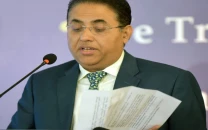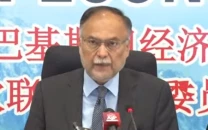IT sector seeks policy continuity
Industry leaders urge support for local hardware, freelancer incentives

Key stakeholders of the IT industry have urged the government to continue reforms and extend incentives for the significant growth of the IT sector and its allied fields to enhance export earnings and create jobs for youth, in line with the objectives of the futuristic "Uraan Pakistan" economic plan.
They called for incorporating their recommendations in the upcoming federal budget 2025-26 to enable the IT sector to grow faster, generate more employment opportunities, and contribute more effectively to strengthening the national economy.
They also stressed the need for continuity of existing policies and resolution of regulatory and tax-related challenges in the finance bill for 2025-26, particularly for the IT industry and freelancers, to help accelerate sectoral growth and development.
Khushnood Aftab, Convener of the IT Committee at the Federation of Pakistan Chambers of Commerce and Industry (FPCCI), recommended that the government reduce import duties on essential hardware components such as RAM, SSDs, motherboards, batteries, and displays. This would support the local assembly of fully built imported devices like laptops, desktops, and tablets, fostering local value addition and attracting investment in domestic production facilities.
He noted that increased support for the localisation of computer devices and hardware accessories could help Pakistan conserve foreign exchange, create skilled jobs, and position itself as a competitive exporter in regional markets.
The locally branded IT hardware sector, he added, deserves focused attention as it directly aligns with the "Made in Pakistan" initiative and the broader Digital Pakistan vision.
Furthermore, he emphasised the urgent need for the fair inclusion of local brands in government procurement, which would encourage scale, improve quality, and support domestic industry without compromising standards.
Pakistan must also prepare for the growing demand for AI-integrated hardware and edge computing devices, he said, which could be achieved through the introduction of targeted Research and Development (R&D) tax credits and innovation grants to support companies working on emerging technologies within the country, said Khushnood Aftab, who is also Chairman Viper Group.
Muhammad Umair Nizam, Senior Vice Chairman of the Pakistan Software Houses Association (P@SHA), said the IT sector is a key driver of economic growth, job creation, and foreign investment. He stressed that extending the Final Tax Regime (FTR) for the next decade would provide the policy stability necessary to encourage reinvestment and help Pakistan maintain its competitive edge in global markets.
He also urged the government to harmonise the definitions of IT and Information Technology Enabled Services (ITeS) across federal and provincial tax laws to ensure consistency, eliminate jurisdictional ambiguities, and reduce compliance burdens. A unified framework, he said, would enhance investor confidence, streamline taxation, and promote sectoral growth by creating a predictable regulatory environmentultimately strengthening Pakistan's digital economy and competitiveness.
Equally important, he said, is reducing income tax for salaried IT professionals, which would help retain top talent and mitigate the ongoing brain drain.
Pakistan Freelancers Association Chairman Ibrahim Amin cautioned against increasing tax rates on freelancers, who already pay taxes on every transaction in addition to fees charged by freelancing platforms and payment gateway service providers.
He recommended that the government exempt freelancers and IT companies from withholding tax (WHT) on international transactions under the Exporters' Special Foreign Currency Account (ESFCA) in the upcoming finance bill, following the concurrence of the Ministry of Finance and Revenue.
He also urged the finance division to ensure that all features of the Roshan Digital Account (RDA) be extended to ESFCAs for IT companies and freelancers, enabling them to benefit from streamlined banking services and improved access to capital.
























COMMENTS
Comments are moderated and generally will be posted if they are on-topic and not abusive.
For more information, please see our Comments FAQ